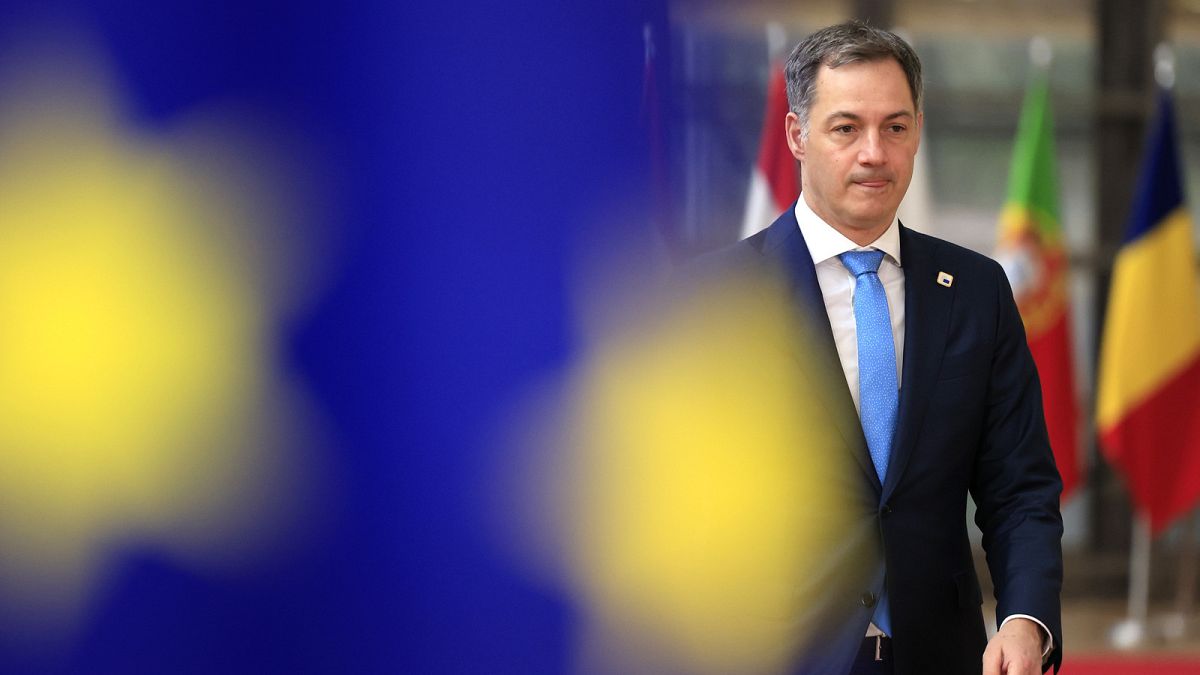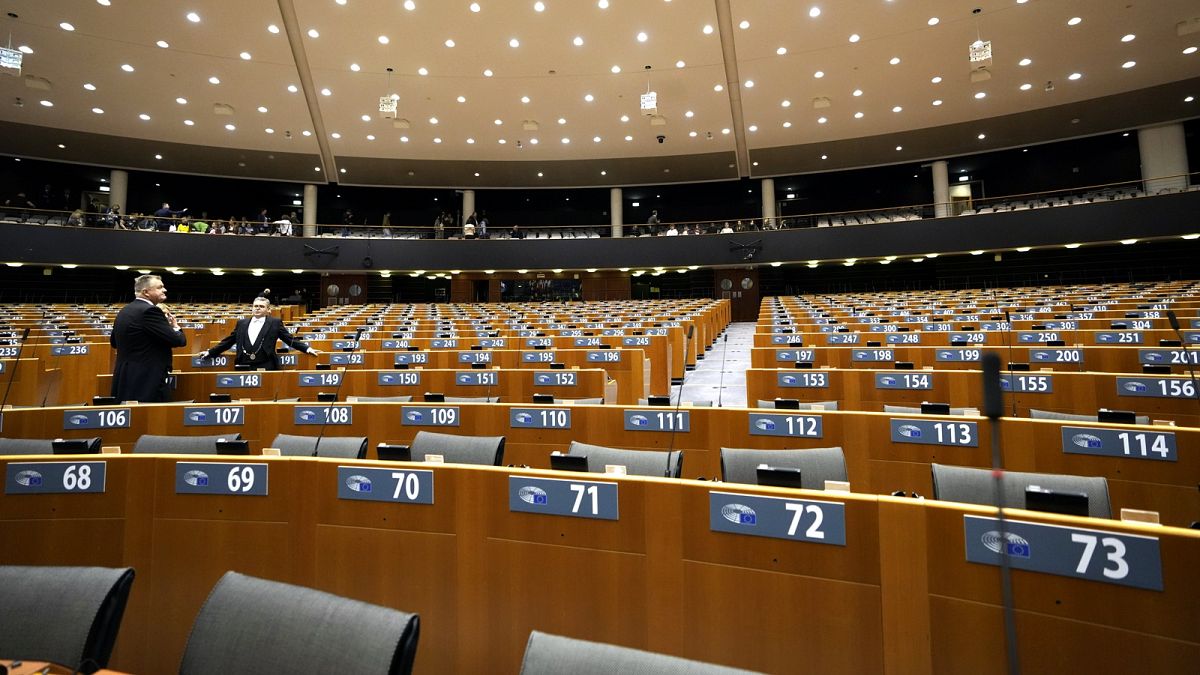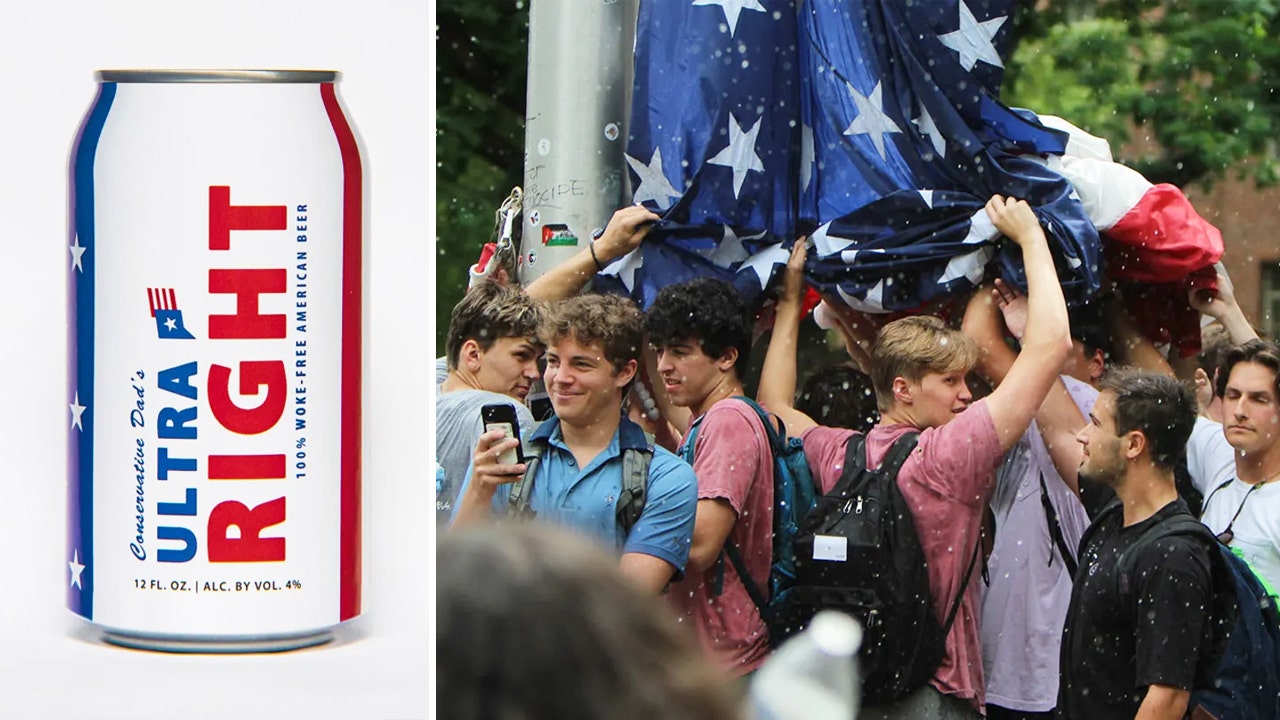World
MEPs vote for EU to ratify key treaty to fight violence against women

Several EU countries still refuse to ratify the Istanbul Convention and the vote in the European Parliament will not force them to do so but it should still confer women in these countries extra protection.
MEPs in Strasbourg on Wednesday backed the bloc’s ratification of the Istanbul Convention, a human rights treaty opposing violence against women and domestic violence, but the European Union countries that have yet to ratify it still won’t have to.
The EU first signed the convention in 2016 but did not ratify it due to objections from multiple member states.
A 2021 EU Court of Justice ruling said that the bloc can ratify the treaty, however, without the agreement of all EU countries.
The EU’s ratification of the Council of Europe treaty was backed by the hemicycle with 472 votes in favour, 62 against and 73 abstentions.
Helena Dalli, Commissioner for Equality, welcomed the vote on Twitter, writing that it represents “a historic step forward that sends a strong message about the importance of women’s rights in the EU. Violence against women has no place in the Union of Equality.”
Łukasz Kohut (S&D, Poland), lead MEP for the Civil Liberties, Justice and Home Affairs Committee, said in a statement that “gender-based violence is the biggest unsolved daily problem in Europe.”
“One in three women in the EU has experienced physical and/or sexual violence – around 62 million women. Enough is enough. The Istanbul Convention is recognised as the most effective tool for combating gender-based violence, as it imposes concrete obligations. A European law anti-violence umbrella will protect women and girls in Europe, through the EU’s accession to the Istanbul Convention.”
Six EU member states have not ratified the convention: Bulgaria, Czechia, Hungary, Latvia, Lithuania, and Slovakia.
The vote in the European parliament will not force them to ratify the treaty.
Another, Poland, is threatening to pull out, while EU neighbour Turkiye withdrew in 2021, prompting widespread protests in the country.
Danish MEP Karen Melchior (Renew) blamed “the right-wing (that) has been making it into a culture war rather than following science and common sense” for these countries’ stance on the Istanbul Convention.
“It’s about being able to be who you are, be protected against violence within your own home. We’ve never said that violence is allowed as long as it happens within the family or murder is allowed, as long as it happens within the family. And it’s crucial that we try to look at experts and knowledge about how to combat violence against women and domestic violence, rather than allowing the far-right and to capture it as part of a culture war,” she told Euronews.
The six EU countries that have not joined and Poland, however, cannot stop the ratification at the EU level as the Court of Justice ruling made clear only a qualified majority is necessary to endorse the MEPs’ vote and not unanimity.
And women in these countries should also benefit from the move.
“Now we have a good basis for having gender-based violence as a euro crime. Now, women can also go to the European Court of Justice. So this is really a basis for all women in Europe and an obligation to those member states who haven’t ratified so far the Istanbul Convention,” Evelyn Regner, an S&D MEP from Austria said.
Belgian MEP Saskia Bricmont (Greens), concurred, explaining that “the (European) commission will be able to open infringement procedures if they do not respect the rights of women and also access to justice for the victims and access to the different services in an integrated manner.”

World
What a judge's gag order on Trump means in his hush money case
NEW YORK (AP) — Virtually every day of his hush money criminal trial, former President Donald Trump talks about how he can’t talk about the case.
A gag order bars Trump from commenting publicly on witnesses, jurors and some others connected to the matter. The New York judge already has found that Trump, the presumptive Republican nominee for president, repeatedly violated the order, fined him $9,000 and warning that jail could follow if he doesn’t comply.
But the order doesn’t stop Trump from talking about the allegations against him or commenting on the judge or the elected top prosecutor. And despite a recent Trump remark, it doesn’t stop him from testifying in court if he chooses.
As he fights the felony charges against him while running for president, Trump has at times stirred confusion about what he can and can’t do in the case. He has pleaded not guilty.
So what does the order do, what doesn’t it and where did it come from?
WHAT IS A GAG ORDER?
Generally speaking, a gag order is a judge’s directive prohibiting someone or people involved in a court case from publicly commenting about some or all aspects of it. In Trump’s case, it’s titled an “Order Restricting Extrajudicial Statements,” with “extrajudicial” meaning outside of court.
Gag orders, particularly in high-profile cases, are intended to prevent information presented outside a courtroom from affecting what happens inside.
Trump also is subject to a gag order in his federal criminal election interference case in Washington. That order limits what he can say about witnesses, lawyers in the case and court staff, though an appeals court freed him to speak about special counsel Jack Smith, who brought the case.
In his recent New York civil fraud trial, Trump was fined a total of $15,000 for comments he made about that judge’s law clerk after a gag order barred participants in the trial from “posting, emailing or speaking publicly” about the court’s staff.
The U.S. Supreme Court has acknowledged that gag orders can pit fair trial rights against free speech rights. The court has struck down some orders that barred the press from reporting on certain cases or court proceedings and rejected as too vague a Nevada court rule that limited what all lawyers could say out of court.
IS TRUMP FIGHTING THE GAG ORDER?
Yes. Before the trial, he asked a state appeals court to postpone the trial while he appeals the gag order, but the court refused. His appeal of the order itself is ongoing.
WHO IS COVERED BY THE GAG ORDER ON TRUMP?
Initially imposed March 26, the gag order bars Trump from making or directing others to make public statements about any juror and about any “reasonably foreseeable” witness’ participation in the investigation or the trial.
It also bars any statements about lawyers in the case, court staffers, prosecution aides and relatives of all of the above, to the extent that the statements are intended to “materially interfere with, or to cause others to materially interfere with” their work on the case “or with the knowledge that such interference is likely to result.”
The order doesn’t apply to Judge Juan M. Merchan or to Manhattan District Attorney Alvin Bragg, whose office is bringing the case. It does apply to comments about their family members, however. Merchan added that provision on April 1 after Trump lashed out on social media at the judge’s daughter, a Democratic political consultant, and made a claim about her that was later repudiated by court officials.
Trump is also allowed to talk about his political opponents, as Merchan made clear on Thursday.
The order also doesn’t bar witnesses from commenting on Trump. Michael Cohen, Trump’s ex-lawyer and an expected witness, has routinely attacked his former boss, leading Trump to complain about not being able to respond in kind.
CAN TRUMP TESTIFY?
Yes. The U.S. Supreme Court has held that criminal defendants have a constitutional right to take the stand in their own defense — or not to.
There was some confusion after Trump said Thursday that because of the gag order, he was “not allowed to testify.” In context, it appeared he was actually referring to his ability to respond to a reporter’s court-hallway question about a witness’ testimony that afternoon.
Trump clarified to reporters Friday that he understood the order wasn’t a bar on testifying. Merchan emphasized the same in court.
“I want to stress, Mr. Trump, you have an absolute right to testify at trial, if that’s what you decide to do after consultation with your attorneys,” Merchan said.
WHY DID TRUMP GET FINED? WHAT CAN’T HE SAY?
Merchan found that Trump violated the gag order with social media posts that laid into Cohen. Among the offending posts: one that asked whether “disgraced attorney and felon Michael Cohen been prosecuted for LYING,” a repost of a New York Post article that described Cohen as a “serial perjurer,” and a Trump post referring to Fox News host Jesse Watters’ claim that liberal activists were lying to infiltrate the jury.
Merchan noted that Trump’s comment on the Watters segment misstated what the host had actually said, making the comment “the words of Defendant himself.”
On the other hand, Merchan declined to sanction Trump for an April 10 post that referred to Cohen and Stormy Daniels, the porn performer who got a $130,000 hush money payment that’s at the heart of the case, as “sleaze bags.”
Trump contended that he was responding to previous comments by Cohen, and the judge said the back-and-forth gave him pause as to whether that post met the bar for a violation.
COULD TRUMP REALLY GO TO TO JAIL OVER THE GAG ORDER?
When Merchan fined Trump $1,000 apiece for nine violations — the maximum fine allowed by law — he wrote that “jail may be a necessary punishment” for some wealthy defendants who won’t be deterred by such a sum.
Merchan added that he “will not tolerate continued willful violations” of the gag order and that, if “necessary and appropriate,” he “will impose an incarceratory punishment,” meaning jail.
It’s unclear what would rise to the level of “necessary and appropriate.”
Defense lawyer Todd Blanche indicated in court Friday that he plans to appeal the judge’s finding this past week that Trump violated the gag order.
Prosecutors have asked Merchan to hold Trump in contempt again and fine him $1,000 for each of four alleged violations from April 22-25. But the prosecution isn’t asking for the former president to be locked up over those comments because they happened before Merchan’s jail warning and because “we’d prefer to minimize disruption to this proceeding,” prosecutor Christopher Conroy said.
World
Fourth body found in search for US and Australian surfers who mysteriously vanished in Mexico

A fourth body has reportedly been discovered in a popular Mexican tourist area, where an American and two Australians vanished last week while on an apparent camping and surfing trip, the local prosecutor’s office said in a statement late on Friday.
American Jack Carter Rhoad, 30, as well as Australian brothers Callum Robinson, 33, and Jake Robinson, 30, were last seen on April 27, the Baja California state prosecutor’s office previously announced. They did not show up at their planned accommodation last weekend.
Investigators discovered three bodies dumped in a pit while searching for the trio on Friday, although officials have not confirmed if the bodies are those of the missing men.
The fourth body was found nearby, the New York Post and other outlets reported. It’s unclear if it’s connected to the other three.
2 AMERICANS FOUND DEAD IN HOTEL ROOM IN MEXICO’S BAJA CALIFORNIA
Australian brothers Callum Robinson and Jake Robinson, top left, and US citizen Jack Carter Rhoad, right, who are missing in Mexico. (Reuters)
Forensic tests on the remains will be conducted by a state laboratory, which will allow for positive identification of the bodies, the prosecutor’s office said in its statement.
Investigators continue to search the rugged area where the bodies were found for additional evidence, the statement added.
The bodies were found in a rugged hillside area in the Mexican state of Baja California near the popular tourist town of Ensenada, about 90 minutes south of the U.S.-Mexico border. Video from the scene shows rescuers installing ropes to enter the pit where the bodies were discovered. The site is cordoned off by police, while a navy boat was also visible in the sea nearby.
The site where the bodies were discovered near the township of Santo Tomás, was near the remote seaside area where the missing men’s tents and the burned-out Chevrolet Colorado pickup truck were found Thursday on a remote stretch of coast.
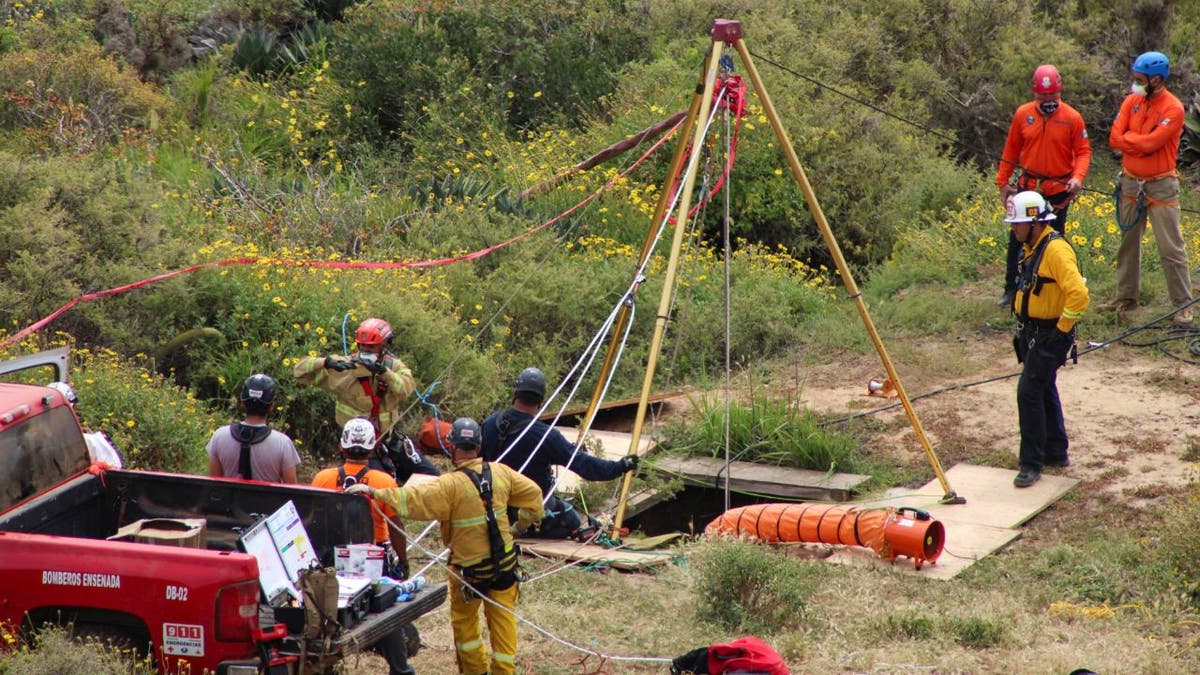
Members of a rescue team work at a site where three bodies were found in Baja California. The team have been looking for one American and two Australian tourists who have been reported missing. (Reuters)
It is unclear what types of injuries the victims suffered or how they died.
“There is a lot of important information that we can’t make public,” María Elena Andrade Ramírez, the chief state prosecutor said.
Baja California prosecutors said Friday that three people had been arrested and charged with a crime equivalent to kidnapping. It was unclear if they might face more charges.
Ensenada Mayor Carlos Ibarra Aguiar said in a news release that a 23-year-old woman had been detained with drugs and a cellphone that had a wallpaper photo of one of the missing men, The San Diego Union-Tribune reports. Officials didn’t specify how the three people were connected to the investigation, saying only that some were directly involved and others indirectly.
LUXURY RESORT SHUTTERS IN MEXICO’S BAJA CALIFORNIA AFTER MYSTERIOUS DEATHS OF 2 AMERICANS
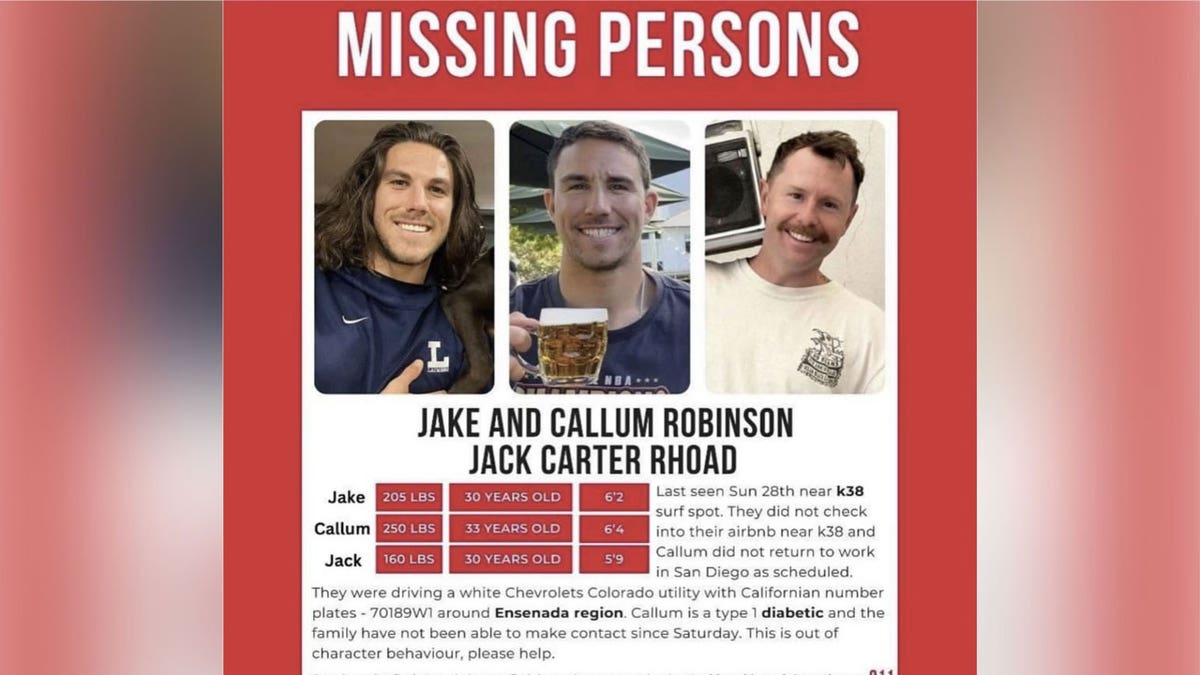
A missing persons’ poster of the trio was distributed earlier this week. (Reuters)
Investigators said that a missing persons report was filed 48 hours after the men were last seen, although the prosecutor’s office began investigating as soon as posts began circulating on social media.
María Elena Andrade Ramírez, the chief state prosecutor, said that while drug cartels are active in the area, she said, “all lines of investigation are open at this time. We cannot rule anything out until we find them.”
The Baja California Attorney General’s Office has said that it has maintained contact with the FBI and relatives of the victims, through consular agencies.
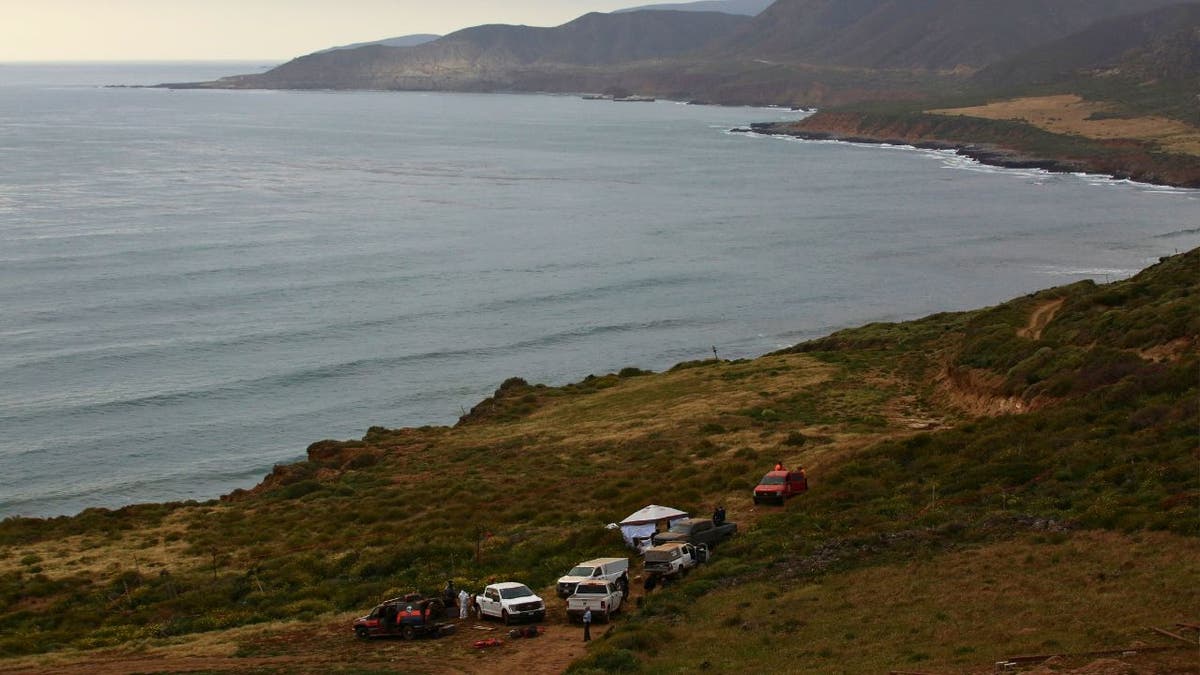
Members of a rescue team work at a site where three bodies were found in the state of Baja California where one American and two Australian tourists were reported missing.
On Wednesday, the missing Australians’ mother, Debra Robinson, posted on a local community Facebook page an appeal for help in finding her sons and noted that Callum is diabetic.
The Australian media reports that Jake is a doctor, while Callum lives in San Diego and is a member of Australia’s national lacrosse team.
The State Department’s travel advisory lists Baja California under its “reconsider travel” category due to crime and kidnapping.
In 2015, two Australian surfers, Adam Coleman and Dean Lucas, were killed in western Sinaloa state, across the Gulf of California — also known as the Sea of Cortez— from the Baja peninsula. Authorities say they were victims of highway bandits.
Reuters and The Associated Press contributed to this report.
World
German socialist candidate attacked before EU elections

Matthias Ecke, a member of Germany’s centre-left Social Democratic Party, was attacked on Saturday while out campaigning.
A candidate for Chancellor Olaf Scholz’s centre-left party in next month’s European Parliament election has been seriously injured while campaigning in eastern Germany, the party said on Saturday.
Matthias Ecke, a Social Democrats (SPD) candidate, was attacked while putting up political posters in Dresden on Friday evening, according to the party.
He was taken to hospital and required surgery for his injuries, it said.
Police said the 41-year-old was hit and kicked by four men and that the same group had apparently attacked a Green Party worker minutes before in the same street.
Interior Minister Nancy Faeser, also a Social Democrat, said if it’s proven that the assault on Ecke was politically motivated, it would represent “a serious attack on democracy.”
The attack was the latest in a series of incidents raising political tensions in Germany ahead of the European Parliament election.
Scholz’s SPD launched their official campaign for the 9 June vote with a rally last week in Hamburg, where the German leader grew up.
“We are experiencing a new dimension of anti-democratic violence,” Faeser said.
She promised “tougher action and further protective measures for the democratic forces in our country.”
Government and opposition parties say their members and supporters have faced a wave of physical and verbal attacks in recent months and have called on police to step up protection for politicians and election rallies.
Many of the incidents have occurred in the former communist east of the country, where the far-right Alternative for Germany party (AfD) is expected to make gains in the European elections and upcoming votes in Germany.
Last week, the car carrying the vice-president of the German parliament, Katrin Goering-Eckardt of the Greens, was surrounded for nearly an hour by protesters as she tried to leave a rally.
The opposition Christian Democrats and the Left party say their workers have also faced intimidation and seen their posters ripped down.
Mainstream parties accuse the AfD of links to violent neo-Nazi groups and of fomenting an increasingly harsh political climate. A prominent AfD leader, Bjoern Hoecke, is currently on trial accused of using a banned Nazi slogan.
Germany’s domestic intelligence service has placed some chapters of the party under surveillance.
The branch of the Social Democrats in Saxony state, where Ecke is their lead candidate for the European elections, said their campaign would go on despite “fascist methods” of intimidation.
“The seeds that the AfD and other right-wing extremists have sown are germinating,” the branch leaders, Henning Homann und Kathrin Michel, said in a joint statement. “These people and their supporters carry responsibility for what is happening in this country.”
-

 World1 week ago
World1 week agoHaiti Prime Minister Ariel Henry resigns, transitional council takes power
-

 World1 week ago
World1 week agoEU Parliament leaders recall term's highs and lows at last sitting
-

 Movie Reviews1 week ago
Movie Reviews1 week agoAbigail Movie Review: When pirouettes turn perilous
-

 Politics1 week ago
Politics1 week ago911 call transcript details Democratic Minnesota state senator’s alleged burglary at stepmother's home
-

 Politics1 week ago
Politics1 week agoGOP lawmakers demand major donors pull funding from Columbia over 'antisemitic incidents'
-

 Science1 week ago
Science1 week agoOpinion: America's 'big glass' dominance hangs on the fate of two powerful new telescopes
-

 World1 week ago
World1 week agoHamas ‘serious’ about captives’ release but not without Gaza ceasefire
-

 Sports1 week ago
Sports1 week agoWhy drafting a successful NFL quarterback remains 'an inexact science'



